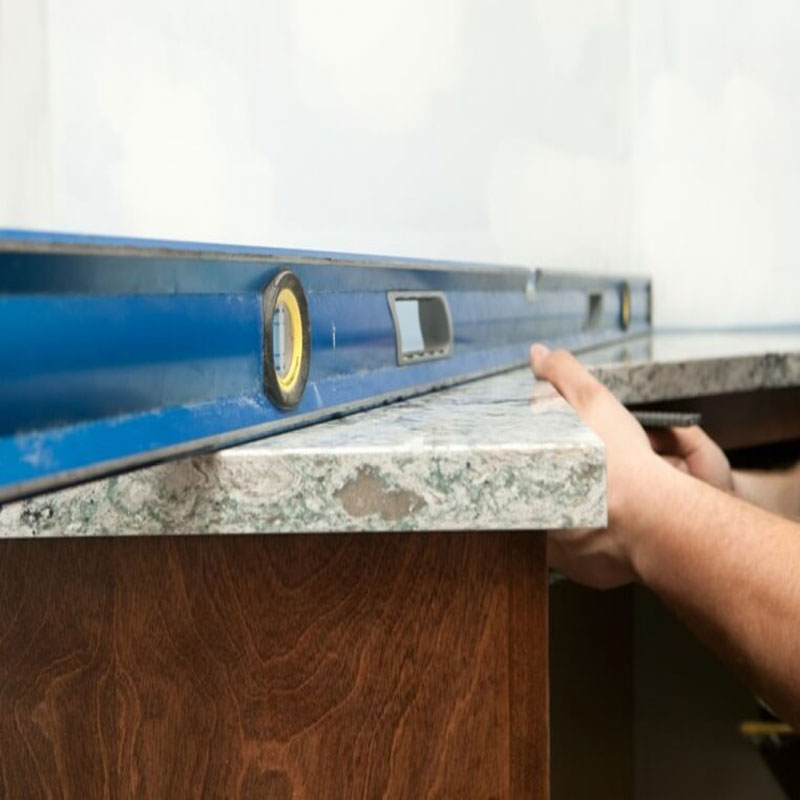How thick is a granite kitchen counter? The most common granite countertop thickness is 3 centimeters (1 1/4 inches). However, 2 centimeters (3/4 inch) and even sometimes 1 centimeter (3/8 inch) slabs are also used, though they often require additional support. Choosing the right thickness is important for both the look and the life of your kitchen. This guide will help you pick the best granite thickness for your needs.

Image Source: www.signaturemarbleandgranite.com
The Importance of Granite Countertop Thickness
Granite is a top pick for kitchen counters because it’s tough and looks amazing. However, picking the right thickness is about more than just style. It actually changes how strong the counter is, how long it will last, and what the final price tag will be.
Basically, a thicker slab means a stronger surface that is less likely to crack or break. The thickness also determines how much weight it can handle, like heavy pots or big appliances. Plus, thicker granite usually looks more expensive and high-end, which adds real value to your kitchen.
Standard Granite Counter Thickness: 3cm (1 1/4 Inch)
The standard granite counter thickness is 3 centimeters (or 1 1/4 inches). This thickness is popular for several reasons:
- Strength: 3cm granite is strong enough to handle everyday use without needing extra support.
- Appearance: It offers a solid, high-end look that many homeowners like.
- Ease of Installation: It’s easier to install than thinner slabs because it doesn’t need as much support.
Benefits of 3cm Granite
- Durability: Resists cracking and chipping better than thinner options.
- No Additional Support Needed: Usually doesn’t require plywood underlayment, saving on material and labor costs.
- Versatile Edge Options: Can accommodate a wider range of edge profiles without compromising strength.
Drawbacks of 3cm Granite
- Cost: Generally more expensive than thinner granite. The impact of granite thickness on price is significant.
- Weight: Heavier, which might require stronger cabinets for support.
- Limited Design Options: Can look too bulky in smaller kitchens.
Exploring 2cm (3/4 Inch) Granite
Another option for granite slab thickness for counters is 2 centimeters (3/4 inch). This thickness is less expensive than 3cm granite, but it has its own set of considerations.
Benefits of 2cm Granite
- Cost-Effective: Lower material cost compared to 3cm granite.
- Lighter Weight: Easier to handle during installation and less stress on cabinets.
- Sleeker Profile: Can provide a more modern, streamlined look, especially in minimalist kitchen designs.
Drawbacks of 2cm Granite
- Requires Support: Almost always needs plywood underlayment to prevent cracking.
- Limited Edge Options: Thinner edge profiles are necessary to maintain structural integrity. The granite countertop edge thickness matters more.
- Less Durable: More prone to damage from heavy impacts.
When to Choose 2cm Granite
2cm granite can be a good choice if:
- You’re on a tight budget.
- You want a thinner, more modern look.
- Your cabinets are not strong enough to support 3cm granite.
- You are willing to use plywood underlayment.
The Rare 1cm (3/8 Inch) Granite
While not common for standard countertops, 1cm (3/8 inch) granite exists. It is typically used for specific applications like backsplashes or vertical surfaces where weight is a concern. Due to its extreme thinness, it always requires a solid substrate for support.
Benefits of 1cm Granite
- Extremely Lightweight: Minimal stress on supporting structures.
- Cost-Effective (Material): Lower material cost due to less granite used.
- Ideal for Vertical Applications: Perfect for backsplashes, wall cladding, and other non-weight-bearing surfaces.
Drawbacks of 1cm Granite
- Extremely Fragile: Very susceptible to cracking and damage.
- Extensive Support Required: Needs to be bonded to a solid substrate like plywood or metal.
- Limited Applications: Not suitable for countertops without significant reinforcement.
What is the best granite thickness for Countertops?
The “best” thickness depends on your specific needs and priorities. However, 3cm granite is generally considered the best choice for most kitchen countertops because it balances cost, durability, and aesthetics. 2cm granite can be a viable alternative if budget is a primary concern, but remember the extra support requirements. 1cm granite is only suitable for specialized applications.
Factors to Consider When Choosing Thickness
- Budget: How much are you willing to spend on your countertops? Granite thickness vs cost is a key factor.
- Kitchen Design: Do you prefer a sleek, modern look or a more substantial, traditional one?
- Cabinet Strength: Can your cabinets support the weight of thicker granite?
- Edge Profile: Do you want a fancy edge profile? Thicker granite allows for more options.
Granite Thickness for Overhang
The granite thickness for overhang is very important for the safety and stability of your countertop. An overhang is the part of the countertop that extends beyond the cabinets. It creates a space for stools or chairs, turning your counter into a breakfast bar or workspace.
Here’s a general guideline:
- Up to 10 inches: 2cm granite might be acceptable with proper support.
- Over 10 inches: 3cm granite is highly recommended.
For overhangs exceeding 10 inches, additional support is crucial, regardless of the thickness. This can be achieved with:
- Corbels: Decorative brackets that provide support from underneath.
- Steel Brackets: Hidden steel supports that offer a clean look.
The minimum granite thickness for countertops with an overhang should be 3cm if you want it to be stable.
Selecting the Right Edge Profile
The edge profile is the shape of the edge of your granite countertop. It can greatly affect the overall look of your kitchen. Thicker granite gives you more edge options.
Here are some common edge profiles:
- Eased Edge: A slightly rounded edge that is simple and safe. Suitable for both 2cm and 3cm granite.
- Beveled Edge: A 45-degree angle cut into the top edge. Works well with both thicknesses.
- Bullnose Edge: A fully rounded edge. Best suited for 3cm granite.
- Ogee Edge: An S-shaped edge that adds a touch of elegance. Requires 3cm granite for stability.
- Waterfall Edge: A design where the countertop extends vertically down to the floor. Usually done with 3cm granite for a seamless look.
Weight Considerations
Granite is heavy, and the weight increases with thickness. Before choosing your granite countertop thickness, make sure your cabinets can handle the load.
Here’s a general idea of the weight per square foot:
- 2cm Granite: Approximately 12 pounds per square foot.
- 3cm Granite: Approximately 18 pounds per square foot.
If you’re unsure about your cabinets’ strength, consult a professional contractor or cabinet installer. They can assess your cabinets and recommend reinforcement if needed.
Installation Tips
Proper installation is crucial for the longevity of your granite countertops. Here are some tips:
- Hire a Professional: Unless you have extensive experience with countertop installation, it’s best to hire a professional installer.
- Ensure Level Cabinets: Make sure your cabinets are perfectly level before installation. Uneven cabinets can put stress on the granite and cause it to crack.
- Use Quality Adhesive: Use a high-quality adhesive to bond the granite to the cabinets or plywood underlayment.
- Seal the Granite: Seal your granite countertops after installation to protect them from stains and water damage.
Impact of Granite Thickness on Price
Thickness significantly affects the price of granite countertops. Here’s a general breakdown:
| Thickness | Material Cost | Installation Cost | Overall Cost |
|---|---|---|---|
| 2cm | Lower | Slightly Higher | Lower |
| 3cm | Higher | Lower | Higher |
While 2cm granite has a lower material cost, the installation cost might be slightly higher because of the need for plywood underlayment. 3cm granite has a higher material cost, but the installation is usually simpler, resulting in a slightly lower installation cost.
Fathoming Granite Grades
Not all granite is created equal. Granite is graded based on its quality, color, and veining. The grade of granite also affects its price.
- Entry-Level Granite: Typically has simpler patterns and colors. It is readily available and more affordable.
- Mid-Range Granite: Offers a wider range of colors and patterns. It is more expensive than entry-level granite but still relatively affordable.
- High-End Granite: Features exotic colors and intricate veining. It is the most expensive type of granite.
Maintaining Your Granite Countertops
Proper care and maintenance will help your granite countertops last for many years. Here are some tips:
- Clean Regularly: Wipe up spills immediately with a soft cloth and mild soap.
- Avoid Harsh Chemicals: Don’t use abrasive cleaners or chemicals that can damage the sealant.
- Use Cutting Boards: Always use cutting boards to protect the surface from scratches.
- Use Coasters: Use coasters under drinks to prevent water rings.
- Reseal Regularly: Reseal your granite countertops every 1-2 years to maintain their stain resistance.
FAQ Section
Q: Can I use 2cm granite on my kitchen island?
A: Yes, you can use 2cm granite on a kitchen island, but it will likely need plywood support underneath, especially if you have an overhang.
Q: Who is responsible for ensuring the cabinets can support the weight of the granite?
A: Ultimately, the homeowner is responsible, but a reputable countertop installer will assess your cabinets and advise you on whether reinforcement is needed.
Q: What happens if I don’t seal my granite countertops?
A: Unsealed granite is porous and can absorb liquids, leading to stains and bacteria growth.
Q: How do I clean granite countertops?
A: Use a soft cloth, warm water, and a mild dish soap. Avoid abrasive cleaners or chemicals.
Q: How often should I reseal my granite countertops?
A: Generally, reseal every 1-2 years, or as recommended by your installer or sealant manufacturer.
Choosing the right granite countertop thickness involves weighing various factors like budget, desired aesthetic, cabinet strength, and the extent of overhangs. By carefully considering these aspects and consulting with professionals, you can ensure that your granite countertops not only enhance the beauty of your kitchen but also stand the test of time.

Hi, I’m Larry Fish, the mind behind MyGrinderGuide.com.. With a passion for all things kitchen appliances, I created this blog to share my hands-on experience and expert knowledge. Whether it’s helping you choose the right tools for your culinary adventures or offering tips to make your kitchen more efficient, I’m here to guide you. My goal is to make your time in the kitchen not only easier but also enjoyable! Welcome to my world of kitchen mastery!
